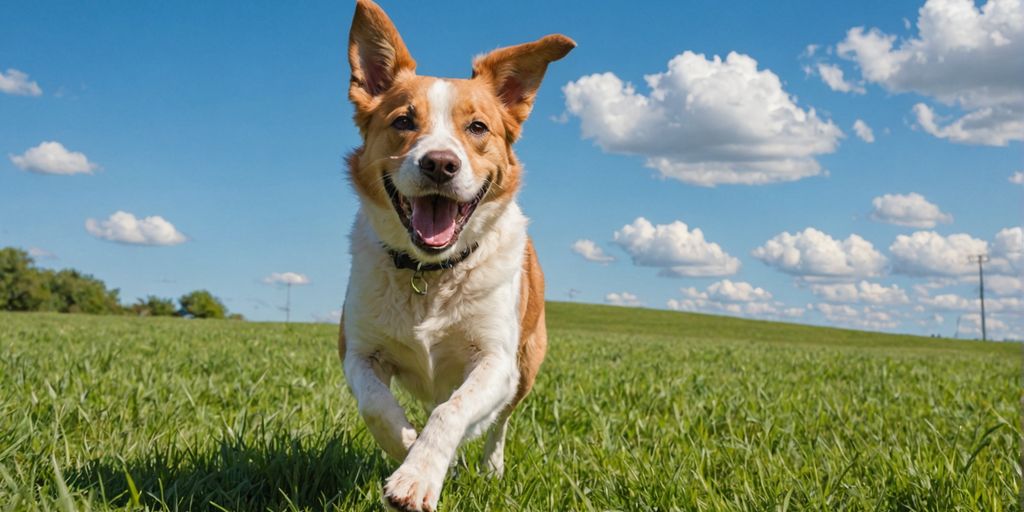Holistic dog health is about looking at the whole picture when it comes to your dog's well-being. It's not just about treating illnesses, but also about preventing them and promoting overall health. This guide will help you understand the benefits of a holistic approach, covering everything from nutrition and exercise to emotional health and natural remedies.
Key Takeaways
- Holistic dog health focuses on the overall well-being of your dog, not just treating specific illnesses.
- A balanced diet with natural and organic options can significantly improve your dog's health.
- Regular exercise and mental stimulation are crucial for maintaining your dog's physical and emotional well-being.
- Holistic veterinary care, including alternative therapies, can complement traditional treatments.
- Creating a toxin-free home environment and using natural remedies can prevent health issues and promote long-term wellness.
Understanding Holistic Dog Health
Defining Holistic Health for Dogs
Holistic health for dogs is about looking at the whole dog—mind, body, and spirit. Instead of just treating symptoms, it focuses on the overall well-being of your dog. This approach combines traditional veterinary care with alternative therapies like acupuncture, herbal medicine, and massage therapy.
The Benefits of a Holistic Approach
A holistic approach offers numerous benefits for your dog. It aims to prevent illnesses rather than just treating them. This can lead to a longer, healthier life for your furry friend. Additionally, it often involves natural treatments, which can reduce the risk of side effects.
Common Misconceptions About Holistic Dog Health
Many people think holistic care is not scientifically backed, but this is not true. While it does include alternative treatments, it also uses proven methods from traditional veterinary care. Another misconception is that it's too expensive. However, investing in your dog's overall health can save money in the long run by preventing costly illnesses.
Holistic dog health is not just a trend; it's a comprehensive approach to ensuring your dog's well-being.
Nutrition and Diet in Holistic Dog Health
The Importance of a Balanced Diet
A balanced diet is the foundation of your dog's health. Feeding your dog a variety of nutrients ensures they get the vitamins and minerals they need. This can help maintain their energy levels, support their immune system, and keep their coat shiny.
Natural and Organic Food Options
When choosing food for your dog, consider natural and organic options. These foods are free from artificial additives, fillers, and preservatives. They provide a more wholesome diet that can improve your dog's overall well-being. Remember, natural and holistic are common terms in the pet food industry, but it's important to understand what they mean.
Supplements and Their Benefits
Supplements can be a great addition to your dog's diet. Omega-3 fatty acids, probiotics, and multivitamins can address specific health issues and support overall health. Always consult with your vet before adding any supplements to ensure they are safe and beneficial for your dog.
A healthy diet is essential for our pets as it helps in maintaining good digestion, strong immunity, and healthy skin. Holistic pet care emphasizes feeding our pets with homemade, organic, or raw food diets, eliminating commercial pet foods filled with additives, fillers, and preservatives.
Exercise and Physical Well-being
Daily Exercise Routines
Daily exercise is essential for maintaining your dog's overall health. Regular physical activity helps prevent obesity, promotes cardiovascular health, and reduces the risk of various health issues. Different dogs have different exercise needs, so it's important to tailor routines to your dog's breed, age, and health status.
"Unlock the Secrets to a Blissful, Healthier Puppy: Discover the Benefits of Holistic Housebreaking"
Mental Stimulation Through Physical Activity
Exercise isn't just about physical health; it also plays a crucial role in mental well-being. Engaging in activities like fetch, tug-of-war, or agility courses can provide both physical exercise and mental stimulation. This helps keep your dog mentally sharp and emotionally stable.
Holistic Approaches to Physical Rehabilitation
For dogs recovering from injuries or surgeries, holistic approaches to physical rehabilitation can be very beneficial. Techniques such as hydrotherapy, acupuncture, and massage can aid in recovery and improve overall well-being. Always consult with a holistic veterinarian to create a tailored rehabilitation plan for your dog.
Emotional and Mental Health
Recognizing Emotional Needs
Understanding your dog's emotional needs is crucial for their overall well-being. Dogs, like humans, experience a range of emotions, and it's important to recognize signs of stress, anxiety, or depression. Providing a loving and supportive environment can help mitigate these issues. Regularly spending quality time with your dog, engaging in interactive play, and offering plenty of affection can make a significant difference.
Stress Reduction Techniques
There are several effective techniques to reduce stress in dogs. Creating a calm and predictable routine can help your dog feel secure. Additionally, incorporating mental enrichment activities, such as puzzle toys or training sessions, can keep your dog mentally stimulated and reduce boredom. A mentally stimulated pet is not only happier but also less likely to engage in destructive behaviors born out of boredom.
Building a Strong Bond with Your Dog
Building a strong bond with your dog is essential for their emotional health. Positive reinforcement training is a great way to establish trust and communication. Consistency in training and daily interactions helps your dog understand what is expected of them, fostering a sense of security. Positive relationships also involve regular veterinary checkups, grooming, and dental care.
By incorporating these mental enrichment activities and creating a stimulating environment at home, you're actively contributing to your pet's cognitive development and emotional well-being.
Holistic Veterinary Care
Alternative Therapies and Treatments
Holistic veterinary care includes a variety of alternative therapies that can complement traditional treatments. These therapies may include acupuncture, chiropractic care, and herbal medicine. Each of these methods aims to treat the whole animal, not just the symptoms. For example, acupuncture can help with pain management and improve overall well-being.
Finding a Holistic Veterinarian
Finding a holistic veterinarian can be a game-changer for your pet's health. Look for vets who are certified in holistic practices and have experience with alternative treatments. You can often find these professionals through online directories or by asking for recommendations from other pet owners.
Integrating Conventional and Holistic Care
Integrating conventional and holistic care can provide a balanced approach to your pet's health. This means using traditional medicine for acute issues while employing holistic methods for long-term wellness. For instance, you might use antibiotics to treat an infection but rely on herbal supplements to boost the immune system afterward.
Holistic veterinary care offers a more natural and sustainable path to ensuring your pet’s overall health and well-being. It is not just a fad but a comprehensive approach that considers our pets’ entire being when it comes to their health.
Natural Remedies and Preventative Care
Herbal and Homeopathic Treatments
Herbs such as milk thistle for liver support, chamomile for soothing the digestive tract, and echinacea for immune system boosting are just a few examples. These natural remedies are gentle and non-toxic, promoting healing from within. Using herbs can be a proactive approach to maintaining your dog's health.
Essential Oils and Their Uses
Essential oils can be beneficial for dogs when used correctly. Lavender oil can help with anxiety, while peppermint oil can aid digestion. Always dilute essential oils and consult with a veterinarian before use.
Preventative Measures for Long-term Health
Preventative care is key to long-term health. Regular check-ups, a balanced diet, and exercise are essential. Additionally, natural supplements can support overall well-being. Taking a proactive approach can prevent many common ailments.
Creating a Holistic Home Environment
Reducing Environmental Toxins
Our pets can easily get exposed to a range of environmental toxins that can cause long-term health problems such as cancer, respiratory illness, and reproductive disorders. Holistic pet care involves the removal of harmful toxins such as pesticides, household cleaners, and flea collars. Pet owners can use natural pest control methods such as diatomaceous earth, essential oils, and nematodes to deter pests without harming their pets.
Safe and Natural Cleaning Products
Using safe and natural cleaning products is essential for maintaining a healthy home environment for your dog. Many commercial cleaners contain harsh chemicals that can be harmful to pets. Opt for products made from natural ingredients like vinegar, baking soda, and lemon juice. These alternatives are not only safer but also effective in keeping your home clean.
Designing a Stress-free Space for Your Dog
Creating a stress-free space for your dog is crucial for their emotional and mental well-being. Ensure your dog has a quiet and comfortable area where they can retreat and relax. This space should be free from loud noises and disturbances. Adding elements like soft bedding, toys, and calming scents can help make this area a sanctuary for your furry friend.
A holistic home environment is not just about physical health but also about creating a nurturing and stress-free space for your dog. By reducing environmental toxins, using natural cleaning products, and designing a comfortable space, you can significantly improve your dog's overall well-being.
Conclusion
In conclusion, embracing holistic dog health is more than just a trend; it's a commitment to ensuring our furry friends lead happy, healthy lives. By focusing on natural care, balanced nutrition, regular exercise, and emotional well-being, we can provide our pets with the best possible care. Holistic approaches, such as using natural remedies and seeking holistic veterinary care, offer a comprehensive way to address our dogs' needs. Remember, a healthy dog is a happy dog, and by adopting these holistic practices, you're not just improving their physical health but also their overall quality of life. Let's continue to explore and implement these strategies for the well-being of our beloved pets.
Frequently Asked Questions
What is holistic dog health?
Holistic dog health means taking care of your dog's whole well-being. This includes their physical, mental, and emotional health. It looks at the complete picture rather than just treating one issue at a time.
How can a holistic approach benefit my dog?
A holistic approach can help your dog live a happier and healthier life. It can improve their diet, exercise, emotional well-being, and even help prevent future health problems by looking at the root causes.
Are there any common myths about holistic dog health?
Yes, some people think holistic care is not scientific or effective. However, many holistic methods are backed by research and can work well alongside traditional veterinary care.
What should I feed my dog for a holistic diet?
A holistic diet often includes natural, whole foods like fresh meats, vegetables, and grains. Avoid processed foods with artificial additives. You can also consider organic and raw food options.
Can holistic care replace traditional veterinary treatments?
Holistic care is best used together with traditional veterinary treatments. It can complement conventional methods and offer additional benefits, but it shouldn't completely replace them.
How do I find a holistic veterinarian?
You can start by asking for recommendations from friends or searching online. Look for vets who are certified in holistic methods and have good reviews from other pet owners.

